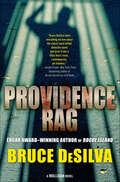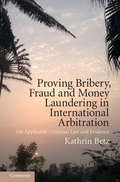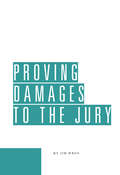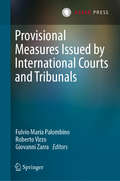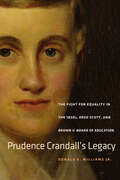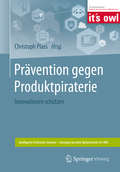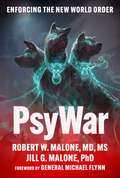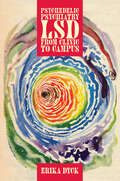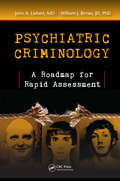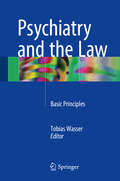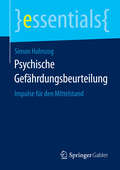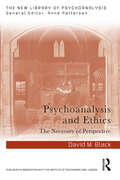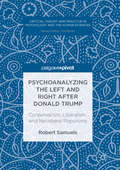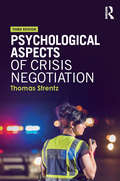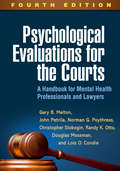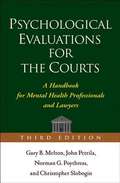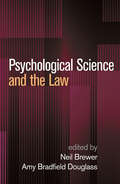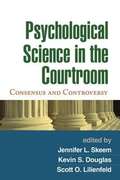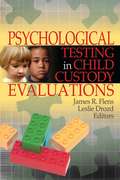- Table View
- List View
Providence Rag: A Mulligan Novel (Liam Mulligan #3)
by Bruce DeSilvaThe Edgar winner “melds moral dilemmas with a suspenseful plot in his third novel featuring Providence, R.I.-based reporter Liam Mulligan, his best yet” (Publishers Weekly, starred review).Inspired by a true story, Providence Rag finds Mulligan, his pal Mason, and the newspaper they both work for at an ethical crossroad. The youngest serial killer in history butchered five of his neighbors before he was old enough to drive. When he was caught eighteen years ago, Rhode Island’s antiquated criminal statutes—never intended for someone like him—required that all juveniles, no matter their crimes, be released at age twenty-one. The killer is still behind bars, serving time for crimes supposedly committed on the inside. That these charges were fabricated is an open secret; but nearly everyone is fine with it—if the monster ever gets out more people will surely die. But Mason is not fine with it. If officials can get away with framing this killer they could do it to anybody. As Mason sets out to prove officials are perverting the justice system, Mulligan searches frantically for some legal way to keep the monster behind bars. The dueling investigations pit the friends against each other in a high-stakes race against time—and snares them in an ethical dilemma that has no right answer.“There is real suspense here. And Mulligan’s character, played off the vicissitudes of his job, is skillfully layered and engaging. DeSilva, who worked for decades at the AP, won an Edgar for Best First Novel for Rogue Island (2010). He knows of what he writes.” —Booklist (starred review)
Proving Bribery, Fraud and Money Laundering in International Arbitration: On Applicable Criminal Law and Evidence
by Kathrin BetzOver the past few decades, arbitration has become the number one mechanism to settle international investment and commercial disputes. As a parallel development, the international legal framework to combat economic crime became much stronger within the fields of foreign public bribery, private bribery, fraud and money laundering. With frequent allegations of criminal conduct arising in international arbitration proceedings, it is crucially important to consider how such claims can be proven. This book analyses relevant case law involving alleged criminal conduct within international arbitration and addresses the most pressing issues regarding applicable criminal law and evidence. It is an essential resource for practising lawyers and academics active in the field of international investment and commercial arbitration.
Proving Damages to the Jury
by Jim WrenBig damage awards don't just happen. You need a plan for success. Any lawyer who has tried a damages case has experienced the quandary: What damage number do I give the jury? Is it enough? Is it too much? How do I ask for it? How do I support it? To give your clients justice, you need something more than a "hit or miss / hope and go" approach to damages. You need an intelligent damages strategy that encompasses every phase of the litigation and trial. Proving Damages to the Jury gives you that strategy. Relying on a solid foundation of current jury science research and more than 30 years of courtroom experience, author Jim Wren walks you through every step of your damages case, from the initial screening of a potential client to closing argument at trial. These abbreviated excerpts are just a sampling of what you will learn: Before Trial Discovery Develop a discovery plan to support your complete damages story. Take video depositions of your damage fact witnesses. Set up damage issues with requests for admission. Challenge the defense medical expert Visuals Use the seven stages of your damage story as the organizing principle for your visual strategy. Translate your damage story into visuals by working through these ten key questions: Enhance your credibility by making "verifiable proof" a focal point of your visual strategy. At Trial Voir Dire Raise the issue of frivolous lawsuits. Address jurors' reluctance to award damages for unintentional conduct. Plan the sequence of your questions. Opening Statement Focus on choices, rather than results, in presenting damages. Start with the question for the jury. Help jurors understand the significance of their role. Cross-Examination Understand what makes cross examination powerful. Use "you can understand" questions to validate the consequences of the plaintiff's injury. Encourage juror anger as a motivator for damages. Closing Argument Provide guidance for intangible damages. Help jurors make a significant difference.
Provisional Measures Before International Courts and Tribunals
by Cameron MilesSince the decision of the International Court of Justice in LaGrand (Germany v United States of America), the law of provisional measures has expanded dramatically both in terms of the volume of relevant decisions and the complexity of their reasoning. Provisional Measures before International Courts and Tribunals seeks to describe and evaluate this expansion, and to undertake a comparative analysis of provisional measures jurisprudence in a range of significant international courts and tribunals so as to situate interim relief in the wider procedure of those adjudicative bodies. The result is the first comprehensive examination of the law of provisional measures in over a decade, and the first to compare investor-state arbitration jurisprudence with more traditional inter-state courts and tribunals.
Provisional Measures Issued by International Courts and Tribunals
by Fulvio Maria Palombino Roberto Virzo Giovanni ZarraThis book makes a significant contribution to the comprehension of the law and practice of provisional measures issued by international courts and tribunals, including international commercial arbitration. After having analyzed the common features of provisional measures, it provides an overview of the peculiarities of these orders within the context of different international proceedings (e.g. the ICJ, the ITLOS, the CJEU, the ICC, human rights courts and investment arbitration). In this regard, the book is valuable in offering a broad and rigorous comparative analysis between the various forms of provisional measures.Owing to its original cross-cutting and case-driven approach, the book will be an essential tool for both scholars and practitioners dealing with the law of provisional measures in international adjudication. Indeed, this book will be an important novelty in international law libraries due to the broad range of regimes scrutinized and to a detailedanalysis of the general trends within the contemporary law of provisional measures.Fulvio Maria Palombino is Professor of International Law in the Department of Law at the University of Naples Federico II, Naples, Italy.Roberto Virzo is Associate Professor of International Law in the Department of Law, Economics, Management and Quantitative Methods (DEMM) at the University of Sannio, Benevento, Italy.Giovanni Zarra is Adjunct Professor of International Law in the Department of Law at the University of Naples Federico II, Naples, Italy.
Prozessmodernisierung in der öffentlichen Verwaltung: Prozesse selbst analysieren, optimieren, digitalisieren. Praxisnah mit zahlreichen Leitfäden
by Nina Ferreira da CostaDieses Buch zeigt, wie der Weg der Verwaltungsdigitalisierung durch optimierte Prozesse erfolgreich beschritten werden kann. In einer Zeit, in der die Komplexität der Aufgaben, der Druck zur Digitalisierung und der Personalmangel stetig steigen, müssen Kommunalverwaltungen ihre Prozesse kritisch hinterfragen, Schwachstellen darin beseitigen und so die Arbeitslast der Beschäftigten verringern. Zu Beginn erfahren Sie, welche Vorteile Kommunen von der Digitalisierung ihrer Prozesse erwarten können und welche Abläufe sich dafür eignen. Es folgen Empfehlungen für die Etablierung eines Teams für das Prozessmanagement, das als unabhängiger Vermittler und zentrales Kompetenzzentrum rund um die Prozessmodernisierung dienen kann. Ein eigenes Kapitel bietet Grundlagen zur Prozessdigitalisierung sowie einen ausführlichen Leitfaden zur Prozessanalyse. Es folgen Vorschläge und Tipps für die Durchführung von Workshops, in denen die Prozessbeteiligten gemeinsam praxistaugliche Verbesserungen entwickeln. Konkrete Tipps zum Umgang mit internen Widerständen helfen dabei, die Akzeptanz für Veränderung zu steigern. Das bisher entwickelte Verständnis der jeweiligen Prozesseigenheiten und die Anleitungen zur Anforderungsformulierung helfen den Entscheider:innen, die bestmögliche Software für die Digitalisierung der Prozesse zu finden. Doch Software alleine löst keine Probleme: nur durch die kritische Analyse der Ist-Prozesse und die aktive Mitgestaltung der Beschäftigten kann die Verwaltungsmodernisierung zielgerichtet und flächendeckend erfolgen. Dieses Buch zeigt anhand von Erfahrungswerten, Best Practices und Leitfäden, wie dies gelingen kann. Aus dem Inhalt Digitalisierung: Problem oder Lösung? Prozessdigitalisierung in der Verwaltung: Voraussetzungen und Potenziale Verantwortung statt Zuständigkeit: ein Prozessteam etablieren und Prozesse abbilden Grundlegende Tipps zur Prozessoptimierung Prozessanalyse von A bis Z – wer macht wann was, und warum? Optimierung und Digitalisierung: Prozessworkshops und Software-Suche „Das haben wir schon immer so gemacht“ – Widerständen begegnen
Prudence Crandall's Legacy: The Fight for Equality in the 1830s, Dred Scott, and Brown v. Board of Education (The Driftless Connecticut Series)
by Donald E. WilliamsThe &“compelling and lively&” story of a pioneering abolitionist schoolteacher and her far-reaching influence on civil rights and American law (Richard S. Newman, author of Freedom&’s Prophet). When Prudence Crandall, a Canterbury, Connecticut schoolteacher, accepted a black woman as a student, she unleashed a storm of controversy that catapulted her to national notoriety, and drew the attention of the most significant pro- and anti-slavery activists of the early nineteenth century. The Connecticut state legislature passed its infamous Black Law in an attempt to close down her school. Crandall was arrested and jailed—but her legal legacy had a lasting impact. Crandall v. State was the first full-throated civil rights case in U.S. history. The arguments by attorneys in Crandall played a role in two of the most fateful Supreme Court decisions, Dred Scott v. Sandford, and the landmark case of Brown v. Board of Education. In this book, author and lawyer Donald E. Williams Jr. marshals a wealth of detail concerning the life and work of Prudence Crandall, her unique role in the fight for civil rights, and her influence on legal arguments for equality in America that, in the words of Brown v. Board attorney Jack Greenberg, &“serves to remind us once more about how close in time America is to the darkest days of our history.&” &“The book offers substantive and well-rounded portraits of abolitionists, colonizationists, and opponents of black equality―portraits that really dig beneath the surface to explain the individuals&’ motivations, weaknesses, politics, and life paths.&” ―The New England Quarterly &“Taking readers from Connecticut schoolrooms to the highest court in the land, [Williams] gives us heroes and villains, triumph and tragedy, equity and injustice on the rough road to full freedom.&” —Richard S. Newman, author of Freedom&’s Prophet
Prävention gastrointestinaler Infektionen im Flüchtlingslager Kutupalong: Eine systematische Übersichtsarbeit
by Anna-Maria RagerDas Buch thematisiert Maßnahmen der Verhältnisprävention, die in besonderer Weise dazu geeignet sind, die Entstehung und Verbreitung von gastrointestinalen Infektionen in Flüchtlingslagern zu reduzieren. Dies erfolgt am Beispiel der Rohingya-Flüchtlinge im Flüchtlingslager Kutupalong in Bangladesch. Es erfolgt final eine Ableitung praxisnaher Handlungsempfehlungen.
Prävention gegen Produktpiraterie: Innovationen schützen (Intelligente Technische Systeme – Lösungen aus dem Spitzencluster it’s OWL)
by Christoph PlassIm Rahmen des Spitzenclusters it's OWL sind in den letzten 5 Jahren technisch innovative Lösungen entstanden, die den Unternehmen einen Wettbewerbsvorsprung ermöglichen. Dieses Know-how abzusichern und gegen Plagiatoren zu schützen, ist Gegenstand des Projekts Prävention gegen Produktpiraterie gewesen.Entstanden sind durchgängige Methodenketten zur Erarbeitung von ganzheitlichen Schutzkonzeptionen, die weit über die isolierten Ansätze konstruktiver Gestaltung des Produktes oder Markierungstechniken hinausgehen.Die Autoren zeigen die Systematik auf und belegen anhand von Praxisbeispielen, wie sie anzuwenden ist: Von der Analyse der Bedrohung, über die Festlegung von Schutzmaßnahmen bis hin zur Gestaltung von Bauteilen mit Hilfe moderner additiver Fertigungsverfahren, die Reverse Engineering erschweren.Das Buch zielt auf Praktiker in der Industrie, die sich mit dem Schutz ihrer Produkte befassen.
Préstamo de rapiña
by Kenneth Eade Ana Claudia Macoretta¿Acaso los "demasiado grandes para caer" pueden salirse con la suya? Resuelve el misterio de esta novela de intriga jurídica y finaciera No.1 en ventas. Un asesino anda suelto. La madre de April ha sido brutalmente asesinada y su padre molido a palos. El abogado Brent Marks ya había pagado el derecho de peaje en la profesión, llevando casos insignificantes durante los últimos 20 años y, finalmente, había alcanzado una posición que le permitía decidir qué casos aceptar y cuáles no. Le interesaban aquellos vinculados a temas sociales pero, lo que menos se esperaba, era que el caso de April contra los grandes bancos por préstamo fraudulento y ejecución hipotecaria ilegítima terminara convirtiéndose en una investigación de homicidio. A medida que la intriga judicial aumenta, los hechos se descontrolan fuera de la sala de justicia.
PsyWar: Enforcing the New World Order
by Robert W. Malone Jill Glasspool MalonePsyWar: Enforcing the New World Order exposes the history and tactics of modern psychological warfare on the American people and offers a way forward for citizens to resist totalitarian control. PsyWar is when a government coordinates and directs deployment of propaganda, censorship, and psychological operations (psyops) tools in campaigns designed to manipulate public opinion. The authors address critical topics including: Propaganda and Behavioral Control Psychological Bioterrorism Deep State Censorship Surveillance Capitalism Administrative State Objectives Fifth-Generation Warfare PsyWar Tactics Techno-Totalitarianism The New World Order and Global Control Free speech is the most pragmatic tool we have for ascertaining truth. Only by examining all sides of an issue can the truth be chiseled out like a statue out of marble. We must defend all speech—whether untrue, hateful, or intolerable, as that is the only way to protect our right to understand the world. As soon as free speech is restricted, that restriction will be used to sway public opinion. Now is a time when America needs hope. But more than hope, we need to restore our Constitution and Bill of Rights as the foundational documents of our Republic. These documents support and protect our personal sovereignty and are at the core of our fundamental rights as Americans. We must work to make this country great again by restoring our commitment to these foundational principles and ethics.
Psychedelic Psychiatry: LSD from Clinic to Campus
by Erika DyckLSD's short but colorful history in North America carries with it the distinct cachet of counterculture and government experimentation. The truth about this mind-altering chemical cocktail is far more complex—and less controversial—than generally believed. Psychedelic Psychiatry is the tale of medical researchers working to understand LSD’s therapeutic properties just as escalating anxieties about drug abuse in modern society laid the groundwork for the end of experimentation at the edge of psychopharmacology. Historian Erika Dyck deftly recasts our understanding of LSD to show it as an experimental substance, a medical treatment, and a tool for exploring psychotic perspectives—as well as a recreational drug. She recounts the inside story of the early days of LSD research in small-town, prairie Canada, when Humphry Osmond and Abram Hoffer claimed incredible advances in treating alcoholism, understanding schizophrenia and other psychoses, and achieving empathy with their patients. In relating the drug’s short, strange trip, Dyck explains how concerns about countercultural trends led to the criminalization of LSD and other so-called psychedelic drugs—concordantly opening the way for an explosion in legal prescription pharmaceuticals—and points to the recent re-emergence of sanctioned psychotropic research among psychiatric practitioners. This challenge to the prevailing wisdom behind drug regulation and addiction therapy provides a historical corrective to our perception of LSD’s medical efficacy.
Psychiatric Criminology: A Roadmap for Rapid Assessment
by John A. Liebert, MD William J. Birnes, JD, PhDSince the shutdown of our public psychiatry system, the seriously mentally ill are now mostly managed by public safety officers, school officials, emergency first responders and social workers with little experience in recognizing symptoms, triggers and issues. This book addresses the need to recognize the psychiatric component of criminological issues and the methodology of dealing with it on a practical as well as academic basis. It provides a roadmap for training in rapid assessment built on evidence-based emergency psychiatry protocols.
Psychiatry and the Law
by Tobias WasserThis book is specifically designed for new psychiatrists and all other medical professionals who lack the training necessary to confront the complicated legal and ethical issues that arise at the intersection of the mental health and judicial systems. Written by experts in the field, each chapter begins with a challenging case vignette synthesized from a historical legal case that places the reader in the role of the treatment provider. The text presents details of the legal case, historical significance, and the precedent it set before discussing the core principles of that particular subject area. Each chapter reviews the existing literature and reinforces the most salient points. Topics include risk assessment, substance misuse and the law, legal issues within child and adolescent psychiatry, involuntary medication considerations, and other challenges that are often not sufficiently addressed in training. The text is specifically designed for new psychiatrists and other professionals who are transitioning from their studies into clinical practice, concisely explaining and defining the issues in a practical, reader-friendly tone suitable as both a quick-reference in a busy environment or as a resource for private study. Psychiatry and the Law: Basic Principles is an excellent resource for new psychiatrists, psychologists, social workers, students, and other professionals accommodating medical and legal boundaries in clinical practice.
Psychische Erkrankungen als gesellschaftliche Aufgabe: Interdisziplinäre Perspektiven auf aktuelle Herausforderungen (Schriften zu Gesundheit und Gesellschaft - Studies on Health and Society #5)
by Christiane Woopen Carolin Schwegler Pauline MantellPsychische Erkrankungen sind eine gesamtgesellschaftliche Herausforderung mit vielen Facetten und müssen als solche auch interdisziplinär betrachtet werden. Der vorliegende Sammelband setzt genau hier an und hat das Ziel, ein differenziertes Bild über die Bedeutung psychischer Erkrankungen und den gesellschaftlichen Umgang mit ihnen zu zeichnen. Die vielfältigen Fragen, die sich dabei stellen, werden durch Vertreter*innen aus den Gesundheits-, Sozial- und Geisteswissenschaften erörtert. Dies beinhaltet theoretische sowie praktische Perspektiven mit historischen, aktuellen und zukunftsperspektivischen Schwerpunkten, die sich insgesamt dem Ziel widmen, aktuelle Herausforderungen aufzuzeigen und einen Beitrag zur Verbesserung der psychischen Gesundheitsversorgung in den Bereichen der Krankheitsbehandlung, Prävention und Gesundheitsförderung zu leisten.
Psychische Gefährdungsbeurteilung: Impulse für den Mittelstand (essentials)
by Simon Hahnzog Melanie Meyer-Tischler Melanie FaltermeierDieses Essential klärt über Hintergründe und Gestaltungsmöglichkeiten einer psychischen Gefährdungsbeurteilung auf und gibt praktische Impulse zur erfolgreichen Umsetzung, insbesondere in mittelständischen Unternehmen. In der vorliegenden 2. Auflage wurden die Inhalte grundlegend überarbeitet, aktualisiert und um die Erfahrungen aus acht Jahren GBpsych in zahlreichen Unternehmen ergänzt. Verantwortliche erhalten Sicherheit hinsichtlich der rechtlichen Verpflichtungen sowie relevante, praxiserprobte Handlungsempfehlungen für die erfolgreiche Gestaltung eines gesunden Unternehmens.
Psychische Gefährdungsbeurteilung: Impulse für den Mittelstand (essentials)
by Simon HahnzogDieses Essential klärt grundlegend über Hintergründe und Gestaltungsmöglichkeiten einer psychischen Gefährdungsbeurteilung auf und gibt praxisrelevante Impulse zur erfolgreichen Umsetzung, insbesondere in mittelständischen Unternehmen. Seit 2014 sind alle deutschen Unternehmen im Rahmen des Arbeitsschutzgesetzes zu einer Beurteilung der psychischen Gefährdungen ihrer Beschäftigten und zur Gestaltung entsprechender Maßnahmen verpflichtet. Im Falle der psychischen Erkrankung eines Beschäftigten aufgrund übermäßiger beruflicher Belastung drohen dem Arbeitgeber ansonsten Regressforderungen der Sozialversicherungsträger. Einführungen in die Betriebliche Gesundheitsförderung und das Feld der psychischen Erkrankungen bilden den Rahmen für eine fundierte Anwendung der Erkenntnisse.
Psychoanalysis and Ethics: The Necessity of Perspective (New Library of Psychoanalysis)
by David M. BlackPsychoanalysis and Ethics: The Necessity of Perspective is an attempt to look deeply into the relationship between psychoanalysis and ethics, and in particular into the failure of traditional psychoanalytic thinking to recognise the foundational character of ethical values. In recent years, partly because of the climate crisis, the need for an "ethical turn" in our thinking has been recognised with increasing urgency. Using different historical lenses, and with special reference to the thought of the philosopher Emmanuel Levinas and pioneering American psychoanalysts such as Hans Loewald and Stephen Mitchell, the author discusses the perspectives needed in addition to those of science if the facts of "psychic reality" are to be more adequately recognised. In particular, this book emphasises the importance of a coherent account of the role of ethics in shaping the development both of the individual and of society. Psychoanalysis and Ethics is essential reading for those concerned for the importance of ethics in psychoanalytic practice and theory, and more widely for those seeking to understand the place of ethics and religion in psychological development.
Psychoanalyzing the Left and Right after Donald Trump
by Robert SamuelsThis book outlines a new model for global social justice movements that is based on Freud and Lacan's central insights regarding the unconscious, repetition, drives, and transference. Since most of our current social issues are global in nature, Bob Samuels convincingly argues that we need a global solution, but that global solidarity is blocked by narcissistic nationalism and the capitalist death drive. In examining contemporary social movements for global justice, Samuels articulates a comprehensive theory of non-pathological social solidarity, and argues that in the age of multinational corporations and global climate change, we need a new model of global justice and government that requires an understanding of analytic neutrality and free association. This book uses psychoanalytic theories and practices to explain how someone like Trump can rise to power, and explores why liberals have failed to provide a convincing or effective political alternative. It will be compelling reading to students and teachers in a range of psychological and political disciplines, and to anyone interested in psychoanalysis and current politics.
Psychological Aspects of Crisis Negotiation
by Thomas StrentzPsychological Aspects of Crisis Negotiation, Third Edition, explores the methods and strategies for confronting the nine types of subjects typically encountered in hostage/suicide sieges by correctional staff and law enforcement crisis negotiators. Strentz, an experienced negotiator who designed and directed the FBI’s hostage negotiator program, lays out the critical elements that are required for a successful encounter with a hostage taker or other malfeasant. This book highlights psychological dynamics of negotiations as they apply to the negotiator, the hostage, and the subject. It discusses the predictors of surrender versus the need for a tactical intervention and examines the phases of a hostage crisis and the changing focus as the crisis develops. Referencing historical events such as the Bay of Pigs invasion and the Challenger and Columbia incidents, this text demonstrates how faulty group decision making can spell tragedy. Enhanced with case studies to put the material into context, this third edition also includes new chapters on the SWAT team/crisis negotiator interface and on the genesis of the increased incidence of mentally ill hostage takers. Based on decades of experience in the fi eld and practical advice from a national expert, this volume arms negotiators with the knowledge and tools they need to defuse crises and increase the odds that hostages will survive.
Psychological Evaluations for the Courts, Fourth Edition: A Handbook for Mental Health Professionals and Lawyers
by John Petrila Randy K. Otto Gary B. Melton Norman G. Poythress Christopher Slobogin Douglas Mossman Lois O. CondieTens of thousands of readers have relied on this leading text and practitioner reference--now revised and updated--to understand the issues the legal system most commonly asks mental health professionals to address. Highly readable, the volume demystifies the forensic psychological assessment process and provides guidelines for participating effectively and ethically in legal proceedings. Presented are clinical and legal concepts and evidence-based assessment procedures pertaining to criminal and civil competencies, the insanity defense and related doctrines, sentencing, civil commitment, personal injury claims, antidiscrimination laws, child custody, juvenile justice, and other justice-related areas. Case examples, exercises, and a glossary facilitate learning; 19 sample reports illustrate how to conduct and write up thorough, legally admissible evaluations. New to This Edition *Extensively revised to reflect important legal, empirical, and clinical developments. *Increased attention to medical and neuroscientific research. *New protocols relevant to competence, risk assessment, child custody, and mental injury evaluations. *Updates on insanity, sentencing, civil commitment, the Americans with Disabilities Act, Social Security, juvenile and family law, and the admissibility of expert testimony. *Material on immigration law (including a sample report) and international law. *New and revised sample reports.
Psychological Evaluations for the Courts, Third Edition
by Gary Melton John PetrilaThis is the definitive reference and text for both mental health and legal professionals. The authors offer a uniquely comprehensive discussion of the legal and clinical contexts of forensic assessment, along with best-practice guidelines for participating effectively and ethically in a wide range of criminal and civil proceedings. Presented are findings, instruments, and procedures related to criminal and civil competencies, civil commitment, sentencing, personal injury claims, antidiscrimination laws, child custody, juvenile justice, and more.
Psychological Science and the Law
by Neil Brewer and Amy Bradfield DouglassPsychological research can provide constructive explanations of key problems in the criminal justice system--and can help generate solutions. This state-of-the-art text dissects the psychological processes associated with fundamental legal questions: Is a suspect lying? Will an incarcerated individual be dangerous in the future? Is an eyewitness accurate? How can false memories be implanted? How do juries, experts, forensic examiners, and judges make decisions, and how can racial and other forms of bias be minimized? Chapters offer up-to-date reviews of relevant theory, experimental methods, and empirical findings. Specific recommendations are made for improving the quality of evidence and preserving the integrity of investigative and legal proceedings.
Psychological Science in the Courtroom
by Jennifer Skeem Kevin DouglasThis rigorous yet reader-friendly book reviews the state of the science on a broad range of psychological issues commonly encountered in the forensic context. The goal is to help professionals and students differentiate between supported and unsupported psychological techniques--and steer clear of those that may be misleading or legally inadmissible. Leading contributors focus on controversial issues surrounding recovered memories, projective techniques, lie detection, child witnesses, offender rehabilitation, psychopathy, violence risk assessment, and more. With a focus on real-world legal situations, the book offers guidelines for presenting scientific evidence accurately and effectively in courtroom testimony and written reports.
Psychological Testing in Child Custody Evaluations
by Leslie Drozd James R. FlensA focused look at the uses-and misuses-of psychological tests in the context of child custodyThis book presents an advanced examination of psychological testing and usage in the child custody arena. It addresses test selection issues, provides insightful discussions of how to confront confirmatory biases and avoid the distortion of test findings, and presents clear instructions for the use of specific tests, including MMPI-2 and Rorschach, and a point/counterpoint discussion of the strengths and weaknesses of the Ackerman-Schoendorf Scales for Parent Evaluation of Custody (ASPECT).Psychological Testing in Child Custody Evaluations can be viewed as a work in three parts. The first section addresses theoretical and test usage issues, with chapters focusing on: addressing test selection issues from legal and psychological perspectives bias issues that interfere with the evaluator&’s ability to collect and consider data objectively a functional, comprehensive approach to the use of psychological tests in a child custody evaluation-with a conceptual framework for choosing assessment techniques to assess parenting competencies and other variables important in forming opinions about custodial placement and visitation access, and a practical example of how to present psychological test data in an advisory report to the court a look at psychological testing from an attorney&’s point of viewThe second section of Psychological Testing in Child Custody Evaluations focuses on the MMPI-2 and the Rorschach Inkblot Test in the child custody context, investigating hypotheses that can be inferred from the MMPI-2 regarding parenting behaviors, and the use and value of the Rorschach. This section examines: the foundation from which the MMPI-2 can generate expectations regarding five basic issues-the quality of attachment and bonding, potential for antisocial behavior, temper control, alienation of affection, and chemical abuse and dependence the range of variables that will generate useful hypotheses regarding parent-child interactions and family systems the effects of the circumstances of litigation on score elevations-including recommended limits as to how much elevation can be dismissed as only contextual the important differences between occasion validity and attribute validity the clinical application of an objective interpretation system, including the courtroom credibility of explicit convergent validity the use of the Rorschach in child custody evaluations findings from a study using the Rorschach to address specific parenting variablesThe third section of Psychological Testing in Child Custody Evaluations is a focused point-counterpoint discussion of ASPECT, between test creator Marc J. Ackerman and Mary Connell, President of the American Academy of Forensic Psychology. This book is essential reading for child custody evaluators, family law attorneys, and judges practicing in the family law arena, as well as educators and students in these fields.
